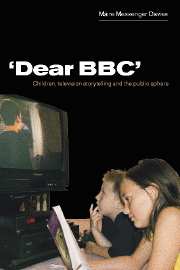Book contents
- Frontmatter
- Contents
- List of tables
- Acknowledgements
- Introduction
- Part I Broadcasting institutions and childhood
- Part II The social functions of broadcasting
- Part III The art of television
- 8 Media literacy and the understanding of narrative (with David Machin)
- 9 Animation
- Conclusion: children and television drama – narrative closure?
- Appendix 1
- Appendix 2
- References
- Index
8 - Media literacy and the understanding of narrative (with David Machin)
Published online by Cambridge University Press: 12 October 2009
- Frontmatter
- Contents
- List of tables
- Acknowledgements
- Introduction
- Part I Broadcasting institutions and childhood
- Part II The social functions of broadcasting
- Part III The art of television
- 8 Media literacy and the understanding of narrative (with David Machin)
- 9 Animation
- Conclusion: children and television drama – narrative closure?
- Appendix 1
- Appendix 2
- References
- Index
Summary
Never, ever in a programme do you see the bad guy win.
Boy, 11, rural primary school, Co. Durhamboy 1 I'd like to see a programme where the bad guy wins; just once.
girl 1 Never ever in a programme do you see the bad guy win …
girl 2 The programme would have to go on for ever and ever until the good guy eventually wins.
boy 2 There should be a programme that wants to go on, that had to go on and they had loads of ideas for it, but the bad guy would have to win, and then you'd have to have another series and the bad guy would come back.
8–11 year olds, rural primary school, Co. Durhamgirl 1 EastEnders get boring, it has been on for 11 years.
boy 1 No, let me get it straight, you want to end this right, how are you going to end it?
girl 1 Easy, they all die (laughter) …
girl 2 The Biz had quite a lot of series – the same thing sort of happens, like one person gets frustrated about something.
interviewer Is that good or bad?
all Bad.
8–11 year olds, inner-London primary schoolIn 1948, Bertolt Brecht asked rhetorically about: ‘the theatre's influence on the formation of taste. How does one express oneself beautifully? What is the best way of grouping? What is beauty anyway?’ (translated in Willett, 1964, p. 151). After several decades in which absolute standards of excellence in performance are seen as impossible to agree on, at least by postmodern critics, and in which the term ‘beauty’ has vanished altogether from critical discourse, we now have to be aware, even more than did Brecht, that taste is not an absolute value, but is relative and ideologically constructed.
- Type
- Chapter
- Information
- 'Dear BBC'Children, Television Storytelling and the Public Sphere, pp. 203 - 224Publisher: Cambridge University PressPrint publication year: 2001

